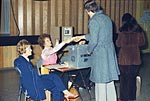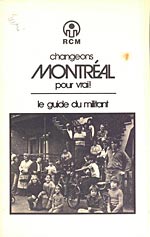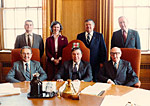

Revitalization of the local political scene
In 1968, universal suffrage was finally adopted. The number of Montréal electors increased considerably, from 380 068 in 1966 to 698 369 in 1970. Apart from the Civic Party of Montréal, three other political groups entered the race in the 1970 election. The Réveil de Montréal Party had only three candidates in one district and one candidate for mayor. The Montreal Party, made up of several anglophones and supported by the business establishment, had 15 candidates.
The main opposition came from the Front d’action politique (FRAP), movement made up of several popular groups active in districts, and militants from central labor bodies. It numbered a thousand members and had 31 candidates running for the office of councillor.
Elections were scheduled for October 25. But a few weeks before, the political climate grew acrimonious as a result of the successive kidnappings of a British diplomat and a Québec minister by the FLQ (Front de libération du Québec). On October 16, the federal government proclaimed the War Measures Act. Several FRAP candidates and many citizens were arrested because of suspected links to the FLQ. In spite of repeated requests by FRAP militants to postpone the election, everything went as planned on October 25. Soldiers were posted at polling stations throughout the city for security purposes.
In spite of it all, the voter turnout was 51%. No opposition group succeeded in having a candidate elected. The Civic Party won on all counts with 52 councillors and 91.8% of votes for mayor Drapeau.
Over the following years, the opposition movement grew stronger, thus favoring the advent of better structured political parties. The Montréal Citizens Movement (MCM) was established in 1974 as an alternative to the Civic Party. The MCM favored the democratization of municipal political life through a greater involvement of citizens in the decision making process, all in an effort to improve the quality of life in an urban environment.
The new party made considerable political gains when 17 of its candidates were elected at the 1974 election. Mayoral candidate Jacques Couture won 39% of the votes. Re-elected with a much lower majority then in 1970, Jean Drapeau received 55% of the votes. For the first time after fifteen years in power, the Civic Party had to come to terms with an organized Opposition in city council.
In the spring of 1978, a third party entered the political arena, namely the Municipal Action Group (MAG), a dissident group from the MCM. The new party was headed by Serge Joyal, member of the federal Liberal Party. Such a division of forces did not favor the Opposition since only two councillors, one from the MCM and the other from the MAG, were elected in 1978. It was a new victory for the Civic Party and Jean Drapeau was re-elected with a clear majority. The Leaders of the two Opposition parties polled 30% of the votes.
Women also gained greater visibility in local political life in the 1970s, both as electors and as candidates. Several were active within the MCM, notably Léa Cousineau, who became its first president in 1974. Three MCM women councillors were also elected that year. In 1978, for the first time in its history, a woman sat on the executive committee. Jean Drapeau chose Justine Sentenne, elected councillor that same year.



































